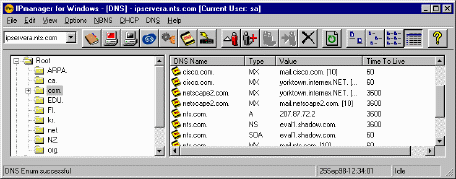|
Shadow IPserver: Dynamic
DNS
Automated user tracking
The Domain Name Service, or DNS, is a directory service that
associates domain names with their associated network address,
similar to a phone book. Addresses must be assigned to match the
specific network location.
As users share address
pools, named entities can take on different addresses, from day to
day or hour to hour. The DNS must dynamically track these changes.
As a companion service to DHCP, IPserver's Dynamic DNS
automatically maintains an accurate DNS mapping, so DHCP clients
can always be found by the same name.

IPserver Dynamic DNS eliminates the need to manually track and
configure intranet names
Peer architecture reliably resolves dynamic
names. Now!
Shadow's Dynamic DNS system was created to provide name services
for today's intranet. Instead of requiring a hierarchical set of
primary and secondary name servers, as with BIND, Shadow Dynamic
DNS servers work together as a co-system. When resolving names for
clients, Shadow's Dynamic DNS servers query each other for the
name/address resolution. A dynamic registration in one Shadow DDNS
server is immediately available to all others.
Shadow Dynamic DNS
servers also operate as replicated servers, or exact copies of each
other. This capability provides high availability for dynamic name
mapping.
Compatible with existing BIND
DNS.
Shadow Dynamic DNS easily integrates into existing BIND
environments. BIND servers can participate in Shadow's co-server
architecture, and Shadow servers will participate in standard BIND
zone transfers.
Server-based updates are reliable, secure, and
compatible with your desktop TCP.
IPserver's DDNS is directly integrated with Shadow's DHCP service.
After assigning an IP address to a DHCP client, IPserver
automatically registers the supplied name and assigned address in
the Dynamic DNS server database.
Unlike alternatives that
burden the client with update responsibility, IPserver maintains
the appropriate mapping without dependence on the client software.
Since the server handles the update, you do not need to replace
your desktop TCP. Server-based updates also maintain an accurate
mapping and limit exposure to unauthorized DNS changes.
Local DNS improves response
time.
Shadow IPservers are designed as a distributed DNS system, and
offer an ideal platform for deployment of DNS service. Deploying
Shadow IPservers near users improves network response and
reliability, thereby reducing bandwidth overhead and load on a
single centralized DNS.
|

